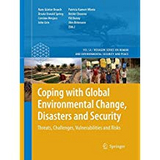Politics of equity and justice in climate change negotiations in North–South relations
Penetrante, Ariel
External Publications
(2010)
in: Hans Günter Brauch / Úrsula Oswald Spring / Czeslaw Mesjasz / John Grin / Patricia Kameri-Mbote / Béchir Chourou / Pál Dunay / Jörn Birkmann (eds.), Coping with global environmental ehange, disasters and security: threats, challenges, vulnerabilities and risks, Berlin, Heidelberg, New York : Springer, 1355-1366
ISBN: 978-3-642-17775-0
DOI: https://doi.org/10.1007/978-3-642-17776-7
Information
A hardening of the front lines between developed and developing countries occurred during the COP15 meeting in Copenhagen with both sides criticizing the other for taking the climate as hostage. The G77 chief negotiator Lumumba Di-Aping compared the behaviour of developed countries to the holocaust. Several countries, particularly the poorer nations, protested blackmailing when they were coerced to sign the Copenhagen Accord, because without signing they would have been unable to access adaptation funds from richer nations. Particularly the United States was blamed for the failure of the talks because President Obama “demanded concessions while offering nothing”. Furthermore, Denmark was highly criticized for convening a meeting of only 26 nations in the last two days of the conference that led to the Copenhagen Accord. Khor argues that it undermined the UN’s multilateral and democratic process of climate change negotiations.3 On the other side, developing countries with emerging economies like China and India were criticized for cooperating at Copenhagen to thwart attempts at establishing legally binding targets for carbon emissions, in order to protect their economic growth. In addition, African countries were criticized by The Australian for their behaviour in turning COP15 into “a platform for demands that the world improve the continent’s standard of living” which is out of place in environmental talks such as the meeting in Copenhagen. The same newspaper commented the comparison of the potential impact of climate change on Africans to the holocaust through the G77 chief negotiator Lumumba Di-Aping as “inane and offensive” and “demonstrates how the conference process was corrupted”. The newspaper criticized as well the opposition of Sudan, Nicaragua, Cuba, Venezuela, Bolivia, and Tuvalu to “Obama’s agreement” as a “demonstration how Copenhagen was about old-fashioned anti-Americanism, not the environment”.




![[Translate to English:] Photo: Alexandra Fante, Bibliothekarin/Open Access-Koordinatorin](/fileadmin/_processed_/f/0/csm__c_Deutsches-Institut-fuer-Entwicklungspolitik_Fante_94ce4fa1ba.jpg)